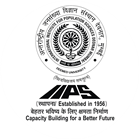- About IIPS
- Academics
- Study @ IIPS
- Departments
- Department of Bio-Statistics and Epidemiology
- Department of Fertility & Social Demography
- Department of Public Health & Mortality Studies
- Department of Migration & Urban Studies
- Department of Population & Development
- Department of Family & Generations
- Department of Survey Research & Data Analytics
- Department of Extra Mural Studies and Distance Education
- Centers
- Controller of Examination
- Programme
- Distance Education (EMS)
- Training
- Facilities/Services
- Resources
- Virtual Learning
- Digital Initiatives (MHRD)
- Notice
- Seminars / Workshops / Conferences
- Conferences
- Publications
- Seminars
- Sponsored Research
- Workshops
- Students exchange
- International Exchange
- National Exchange
- Admission
- Admission Bulletin
- TIME-TABLE For Admission 2021-22
- Model Question Papers
- Fellowships
- Distance Education (EMS)
- International Students
- Visa Information
- Prospectus
- Administration
- Faculty & Staff
- Research & Publications
- Research Projects
- Publications
- Recent Publications
- Library
- Information
- Right to Information
- Annual Report
- Director's Report
- Cells & Commitees
- Cells
- Commitees
- Online Facilities
- Employee's Corner
- Student's Corner
- Memorial Lectures
- Convocation
- IIPS Newsletters
- COVID 19 Information
- Life @ IIPS
LASI Innovations
- Home
- LASI Innovations
LASI Innovations
LASI is the first study in India that will provide a longitudinal database for designing policies and programs for the older population in the broad domains of social, health and economic wellbeing and allow researchers to investigate in sufficient detail the dynamic links among ageing, health, and physical, social and economic environments. LASI adopts the following state of the art of large-scale survey protocols and field implementation.
Computer-Assisted Personal Interviewing (CAPI)
LASI employs computer-assisted personal interviewing (CAPI) technique to record the responses of survey participants. This method requires field teams to be outfitted with laptop computers, pre-loaded with survey questions asked of respondents in a face-to-face interview. Field teams input responses directly into a laptop computer, thereby limiting data entry processes as well as minimizing data recording and entry errors. This also allows real time monitoring of quality of data. Supervisors were given 10% of the completed HHs for validation with a randomly selected set of questions. Field teams were provided feedback based on direct observations, supervisor validations, and quality control analyses to minimize errors. CAPI use and daily data transfers were also provided to give feedback to field agencies and survey teams to help ensure data quality.
Comprehensive Range of Biomarkers
Another innovative feature of the LASI survey instrument is the collection of biomarkers, which can be analysed to provide data on direct health examinations. Given the lack of access in our sample to health care and proper diagnoses, we directly measure biological markers and performance measures instead of relying solely on self-reports. We also recognize the widespread use of healers and traditional medicine, differentiating between types of health care providers. Biomarkers include:
- Physiological Assessments - blood pressure, lung function test, vision test;
- Anthropometric Measurements- height and weight, waist and hip circumference;
- Performance-Based Measurements- grip strength, balance test, and timed walk; and
- Molecular Markers- hs_C- reactive protein, glycosylated hemoglobin, hemoglobin, cytomegalovirus/Epstein-Barr virus.
Use of IT-based Technologies
IT based technologies and including Global positioning system (GPS), will be used for thematic mapping and community analysis to collect the information at community level. Photographic identification and barcode technology were used for matching and anonymizing data.
